18:53
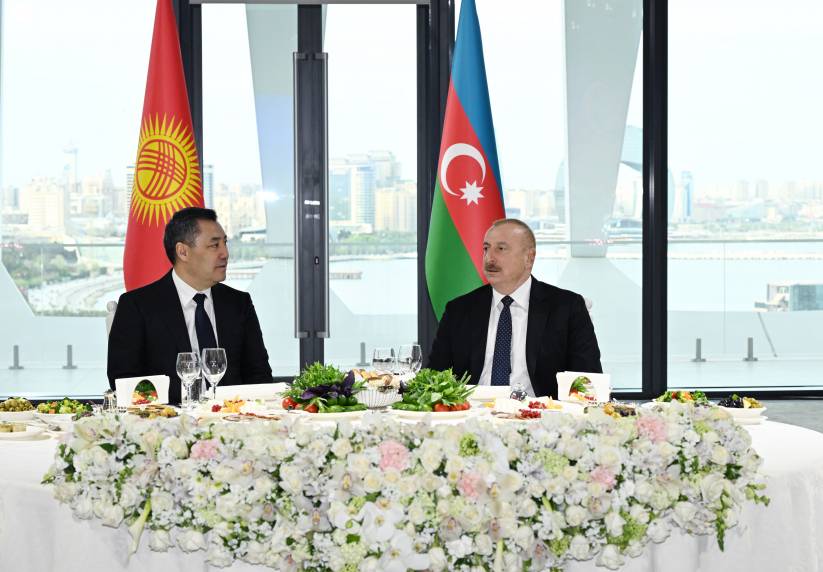
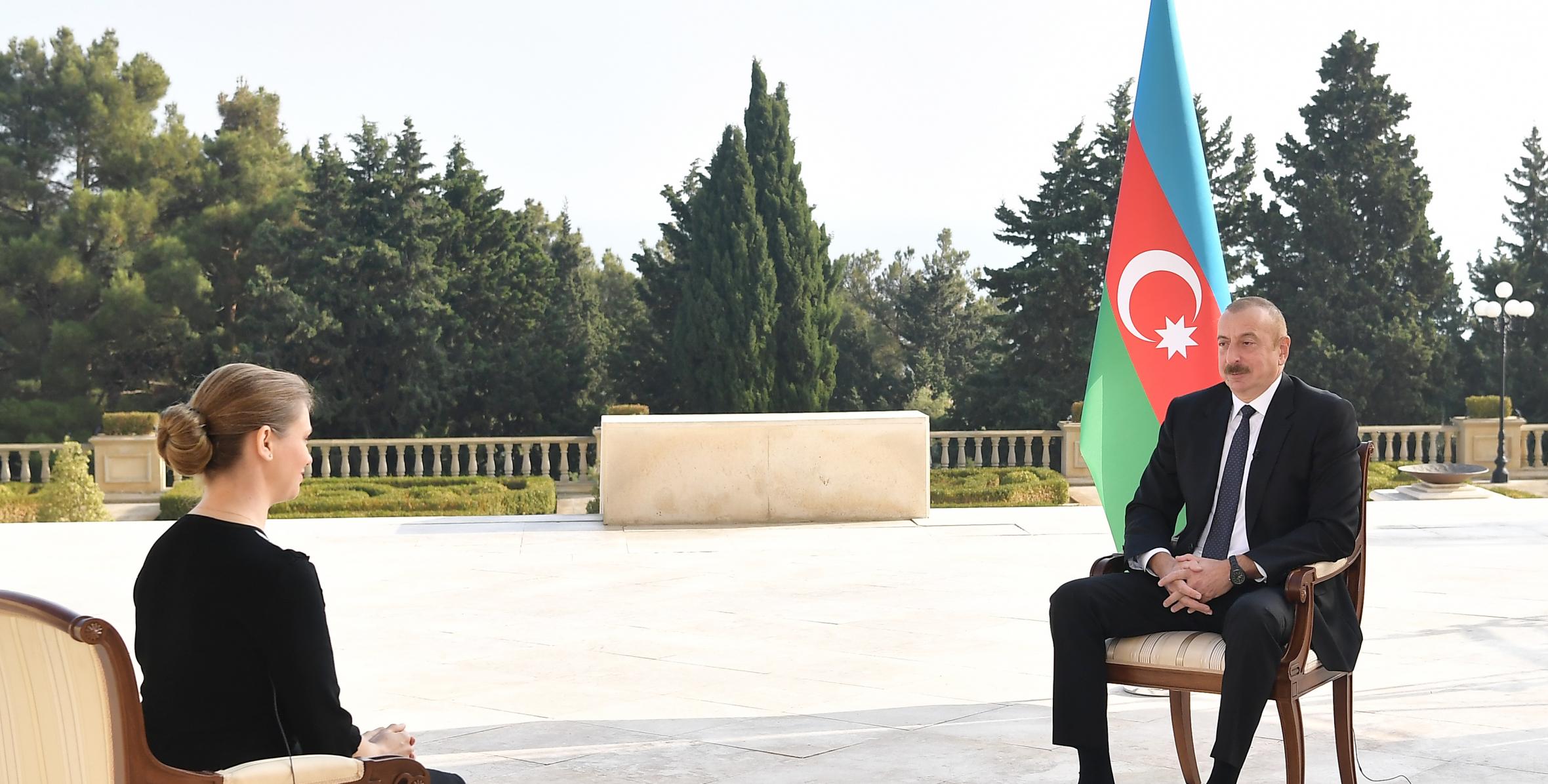
President of the Republic of Azerbaijan Ilham Aliyev has given a video interview to the Russian TASS news agency.
- Good afternoon. We are in Baku today to meet with President of Azerbaijan Ilham Aliyev. My name is Yulia Sharifulina and, on behalf of TASS, I will ask the President several questions on the situation around Nagorno-Karabakh.
- Hello, Mr. President.
- Hello.
- Thank you for agreeing to receive us. I understand that you have recently given several interviews to the media but the situation is changing fast and we observe it literally every day. We would like, of course, to dwell more on some basic issues, which, perhaps, are beyond time and which will help our audience to better understand the position of your country. We all witnessed the 11-hour negotiating marathon in Moscow. Do you think it is still possible to return to the fulfillment of the achieved peace or has it failed completely?
- We remain true to the commitments within the framework of contacts with our partners. From the very beginning and in the process of negotiations on the settlement of the conflict, we have always relied on international law, on our adherence to the resolution of the conflict by peaceful means, including the commitments Azerbaijan took upon itself after the talks in Moscow, which we aspired to and were going to implement. Unfortunately, Armenia flagrantly violated the ceasefire. Less than 24 hours after the talks, the city of Ganja was attacked. Residential areas of the sleeping city of Ganja were targeted deliberately. After the first attack – and there were two of them – the death toll was very high. In other words, Armenia violated the ceasefire in a defiant manner. Thus, it demonstrated disrespect for mediators, disrespect for the commitments it had assumed after such long negotiations in Moscow. Prior to that, after the terms of the ceasefire for the exchange of bodies, prisoners and hostages had been agreed, Armenia had also violated the ceasefire on the battlefield. However, this seemed insufficient for them and they attacked the city of Ganja. In fact, two days ago, they did the same and again at night. This is a very heinous crime. This is international terrorism. The unanimous condemnation of this bloody crime by the world community means that they will not get away with it. The UN Secretary General, the European Union and many countries at the national level have condemned this act of international terrorism.
It is not our fault that the situation is still in the hot phase. I have repeatedly said that Azerbaijan is committed to the principles of settlement. These principles have been developed over the many years of negotiations. I have confirmed in my speeches and in recent contacts with the media that if Armenia acts constructively in the process of negotiations, we are ready to suspend military operations as early as tomorrow. However, the statements we have been hearing from Yerevan completely contradict the fundamental principles developed by the OSCE Minsk Group. The Armenian leadership has recently made very dangerous statements that effectively refute the fundamental principles. In principle, all the activities of Armenia’s new leadership are aimed at disrupting the process of negotiations. Not to undermine this process, but to disrupt it. I have already talked about their numerous statements, provocative actions and attacks on Azerbaijan’s civilian population. Therefore, if the Armenian side finally realizes that the path of military provocations leads them to disaster, we are ready to suspend military operations and resolve the issue at the negotiating table.
- Would your country agree to the need for an urgent military meeting, as Russia says? If so, what format and with the participation of what parties could this meeting be held?
- You know, the political will of the leadership of Armenia and Azerbaijan is paramount here. There is political will on our side. I confirm our position again today. And I confirm it when we have announced the liberation of 13 more settlements in the occupied territories, when the Armenian army is essentially suffering a defeat, when Azerbaijan demonstrates its advantage on the battleground. Nevertheless, not wishing to continue the bloodshed and wishing to save people’s lives, we are ready to resolve this issue by political means.
With regard to military-to-military contacts, the fundamental principles explicitly define this, and we are committed to the fundamental principles I have already mentioned. I think there is no point in repeating – it is the return of the territories occupied by the Armenian side, negotiations on the future of Nagorno-Karabakh, the return of refugees and internally displaced persons to their places of origin, including Nagorno-Karabakh, Shusha. All of this is written in fundamental principles, and the Armenian side agreed to all of this at different stages. Therefore, the question you have just asked is covered in the fundamental principles at the end of the agreement – when all the issues related to de-occupation have been settled, the presence of foreign peacekeeping forces is envisaged. But since the key issues requiring settlement were not agreed on, the parties did not approach this issue. Therefore, there was no clear understanding of who these forces would consist of, what international organizations and what countries would be represented there. Therefore, all this has not been discussed. One thing was clear: the composition and location of these peacekeeping forces should be agreed upon by Azerbaijan and Armenia. This has not been defined either. Therefore, there is no line of contact today, the status quo has been removed, we removed it ourselves and did it within the framework of statements by the presidents of Russia, the United States and France, the repeated statements by the heads of state that the status quo was unacceptable. We were hearing these statements but did not see their implementation. Therefore, we implemented it ourselves. So there is no status quo and there is no line of contact. How can some military observers be deployed there technically and where exactly can they be deployed? After all, the situation on the battlefield changes every day. So there will be some foreign observers but where will they stand – on mountains, in valleys, on bridges? So all this requires a very detailed study. This is also a huge risk for those who deem it necessary to send their military contingent there. So all this must be agreed upon: composition, mandate, timing, goals. Of course, all of this should be done within the framework of the fundamental principles, which, as I said, are accepted by us and rejected by the Armenian side.
- But if the situation does require it, will your country agree to the introduction of Russian military observers? And if not Russian, what other countries could take part in this mission and what countries would you strongly object to?
- You know, Russia, like the United States and France, is a co-chair of the OSCE Minsk Group, and within the framework of this mandate, the countries have very close interaction with each other. During the hot phase of the conflict, I observe both in the Western and Russian media that the Nagorno-Karabakh issue is probably the only issue where there are no disagreements between these countries. And perhaps this is actually the case. Wherever we look, there are sanctions, confrontations, claims, etc., and they are also mutual. Therefore, of course, I am sure that this issue should be agreed upon within the framework of the co-chairmanship format among these countries and, after it is agreed upon, it should be presented to the parties. So it was all stated in the fundamental principles. After all, it is not us who should determine who the peacekeepers, or observers, as they prefer to be called now, will be. This will be a proposal from the co-chairs of the OSCE Minsk Group, and Azerbaijan and Armenia, for their part, can either veto this or that country or agree to it. Therefore, I do not think that a unilateral decision would correspond to the spirit of cooperation among the three co-chairing countries in determining any kind of military contingent. And most importantly – where? This is the question. The point is not whether Azerbaijan would or would not agree. We need to know the mandate: who is the sponsor, what are the functions, location and activities? Are they going to stand on the mountains or in an open field and watch who shoots first? This is dangerous in the first place. Secondly, the way it is described to us, they will be there to observe who breaks the truce. But even if they determine who breaks the truce, what next? Will these people be held accountable? Will there be criminal cases?
Therefore, first of all, it is necessary to determine the order for the implementation of fundamental principles. The Armenian side through its prime minister must clearly reaffirm its commitment. However, the Armenian side represented by the prime minister talks about everything but this. Within the framework of our parallel contacts with representatives of the Russian media, I clearly stated that we are committed to the fundamental principles that imply de-occupation, joint residence of the Armenian and Azerbaijani population in their places of residence, the return of Azerbaijanis to Shusha and other settlements of the former Nagorno-Karabakh autonomous region. The Armenian prime minister only spoke about self-determination. So if he does not accept this and makes statements like the one he made earlier, saying that “Karabakh is Armenia, full stop”, as well as other counterproductive statements that essentially disrupted the process of negotiations, then are we being offered? To return to the status quo which lasted 30 years and did not yield any results? If the Armenian side says that they recognize the territorial integrity of Azerbaijan, secondly, they are committed to the fundamental principles, thirdly, they agree to the withdrawal of troops from the occupied territories, then we can discuss the issue of observers. I think it can be agreed on quite quickly. But when this is not the case, what we are being offered? To stop? Not to continue the de-occupation of our territories? We are offered to make a concession to Armenia, a unilateral concession, while nothing is being offered in return. This is not fair. I believe that this is a wrong approach in relation to Azerbaijan. Let the Armenian side say, let the prime minister of Armenia, who loves to talk a lot and what he says often costs his country dearly, say: yes, there will be de-occupation, there will be withdrawal. I also suggested that they should provide a timetable for the withdrawal from the occupied territories. But then, realizing that it was technically impossible to do this within the framework of one-day negotiations in Moscow, we moved away from this position. Nevertheless, we did not hear the Armenian side say that it was ready to withdraw troops from the occupied territories. As soon as this happens, the issue of the so-called observers can be considered.
- If we talk about consistency in principle, would Azerbaijan agree to start a settlement with a phased transfer of seven districts to Azerbaijan, but keeping the Lachin corridor with Armenia until the final status of Karabakh is determined?
- You know, all this is stated in fundamental principles, and we have accepted it. Our position has always been very constructive, we have always said that yes, we proceed from the understanding that there should be contacts between people, and the Lachin corridor is a part of fundamental principles. At the same time, the fundamental principles also state that all communications are to be opened. This includes not only the Lachin corridor but also the communications between the main part of Azerbaijan and Nakhchivan, and the Armenian side is to provide security guarantees for this corridor. Communications on the border between Armenia and Azerbaijan are to be opened. It was also envisaged that Armenia would have unhindered ground access to the territory of the Russian Federation, which it is not without now but it would be much more convenient to do this through Azerbaijan. In this case, it would not depend on weather conditions, snowfall in the mountains, etc. So all this is part of a compromise package which envisaged de-occupation of Azerbaijani territories, the return of Azerbaijani refugees to all the lands they were expelled from – not only to seven surrounding districts but also to the territory in Nagorno-Karabakh. Before the start of the conflict, Azerbaijanis accounted for 25 percent of the entire population there. And, of course, unhindered access between Nagorno-Karabakh and Armenia through the Lachin corridor. We reaffirm this position.
- Mr. President, it is no secret that Russia has expressed concern over reports on the transfer of militants from the Middle East to the conflict zone, in particular from Syria and Libya. How can you comment on this?
- I have repeatedly said in my public remarks that such concerns are unfounded. So far, we have not been provided with any facts from any side. After all, such statements were made not only by Russia but also by France, and we asked for specific facts, concrete evidence that would prove that we have invited terrorists here. So far, apart from words, no facts have been provided. Not to me as President, not to the heads of our secret service, not to the leaders of the Ministry of Defense – not a single fact. If there are such facts as this is being declared, why isn't this provided to us? They refer to some newspaper publications, but you can write whatever you want now. Therefore, this is not exactly the approach we accept and approve. This is first. Secondly, as I have already said, the Azerbaijani army has proved its combat effectiveness both on the battlefield and in terms of technical capacity. We have practically destroyed most of Armenia’s military-technical potential located in the occupied territories. I have provided these figures. More than 230 tanks have been destroyed mainly by drones but also by modern anti-tank warfare systems – the self-directing Spike missiles. I do not conceal that. As of yesterday, we captured 36 tanks as booty. A huge amount of other equipment has been destroyed, including the most modern anti-aircraft missile systems “S-300” – in fact, not just one launcher. About 40 anti-aircraft missile systems “OSA”, “TOR” installations, which should actually work against drones, but the drones have destroyed them. Did terrorists do that? Have they come from somewhere in Syria? Today, when our army is liberating territories, where are they? Who saw these terrorists? These are our soldiers and officers. We have 100,000 soldiers in the regular Azerbaijani army, not counting the reservists. We did not even announce mobilization. What for? We do not need that. We have announced a partial mobilization. I do not want to provide any figures of how much we have attracted, but we mainly use them for monitoring and control over the already liberated territories. We are not letting reservists into battle. We are using them in the territories we have liberated in order to prevent sabotage attempts of the Armenian side. So there are no facts and there is no need. There are only gossips, rumors. Frankly speaking, I regret that this is being circulated. Thus, an attempt is made to cast a shadow on Azerbaijan. On the other hand, we understand the Armenian side’s humiliation. It had been boasting and bragging of its invincible army all these years, but when we drove them out of our lands so fast that they fling up their heels, of course, they want to imagine that this is not done by the Azerbaijani army but some terrorists or some other countries.
Not a single country is involved in the conflict on our side. There are no terrorists on our side. As for the opposite side, the Armenian side, we have conveyed to the Russian side our concerns that during the active phase of the confrontation a huge amount of weapons has been transferred from Russian cities to the territory of Armenia. We have data, we have flight maps, we have the listing of weapons. All this was brought to the attention of the Russian side. This, of course, raises a lot of questions and bewilderment in our society. Therefore, the situation is like this. If necessary, we can also publish the list of supplies Armenia has received from Russia during this time, specify what transport vehicles were used to deliver them, and which airlines delivered them. These were mostly illegal supplies. We have officially applied to ICAO. The Ministry of Foreign Affairs of Azerbaijan has appealed to ICAO. We have provided information about the transport vessels of certain companies. In fact, there have also been media reports that lethal weapons are being delivered to Armenia under the guise of humanitarian cargo and cargo of the Ministry of Emergency Situations. Since both Georgia and Iran have closed their airspace for military cargo, such smuggling methods are used. We suggested to the Russian side that this was being done by means of smuggling because it is hard for us to believe that Russia, a co-chair of the OSCE Minsk Group and a country that must maintain neutrality, just like France and the United States, is arming the Armenian side during the active phase of the conflict. According to our information, large Russian entrepreneurs of Armenian origin are involved in this scheme. Well-known arms dealers who are under international sanctions are also involved. Our appeal to the Russian side was, among other things, aimed at sorting out this issue. Because if Russian weapons are smuggled and paid for in cash, then we need to figure out how this can be possible. These are the concerns we have, and our concerns are based on facts. As for the so-called terrorists, these are just words.
-Ilham Heydar oglu, in the past 26 years the world could not understand what the final agreement between Armenia and Azerbaijan on Karabakh might look like. How do you see this, and are any concessions still possible for the sake of peace?
- You know, I want to say again that although the Minsk Group co-chairs have not achieved any result and are rightly criticized by the Azerbaijani public for that, I have to say as a person who has been dealing with this issue almost on a daily basis for the last 17 years and spending a huge amount of my time on finding solutions that the Minsk Group has been trying. It was providing proposals and did not stay idle. Therefore, I reject such unfounded accusations. This is not the case. During my contacts with the previous leadership of Armenia, with the previous two presidents, we took major steps forward. We made progress in agreeing on issues that seemed completely impossible to agree on. This was all based on the desire to achieve a result, the desire to reach a settlement through a compromise. It is a different matter though that at a certain stage, when we came too close to a settlement, the Armenian side took a step back. This is also a fact although they have always tried to blame us for this. But at the last moment they refused to return Kalbajar and Lachin. The other five districts had been agreed upon long ago and we were already discussing when Kalbajar and Lachin would be returned. So we were discussing the timing. Neither me nor the Minsk Group had any doubts that this issue had been resolved. I think the former co-chairs of the Minsk Group who were involved in this at the time can confirm this. But then the Armenian side took a step back, and the issue of transferring Kalbajar and Lachin hung in the air. In other words, a mechanism was proposed that involved these two districts forever remaining under Armenian control, which I categorically could not agree to.
Therefore, returning to what you asked, the Minsk Group has created a basis for a settlement. It consists in the de-occupation, the return of refugees, the opening of communications, the joint residence of the Azerbaijani and Armenian communities, which fully complies with the norms of both international law and human morality in general. Because when one of the Armenian presidents spoke about ethnic incompatibility of Armenians and Azerbaijanis, he once again demonstrated his fascist essence. Then how can Azerbaijanis and Armenians live together in Russia, have a common business and mixed families there? How can Armenians and Azerbaijanis live together in some Georgian villages and celebrate both Muslim and Christian holidays? How do thousands of Armenians live with dignity in Azerbaijan as our citizens? Therefore, such theses of fascist nature did not contribute to a settlement, of course.
So all the fundamental principles I have talked about plus the opening of communications form the basis. The Minsk Group co-chairs support the Azerbaijani position. But the current Armenian leadership took a different path. The prime minister said that not a centimeter of land would be given to Azerbaijan. They have published maps of the so-called “Nagorno-Karabakh republic”, which also included seven districts outside Nagorno-Karabakh. They have changed all the names of our cities and our villages. What we saw on the battlefield – it was not easy to break through these defense lines they had been building for 30 years – we saw that they were not going to give up these territories. Because so much had been invested there, so much had been invested in engineering communications and fortifications! This did not at all mean that they were going to leave these lands. When the hot phase of the conflict ends, we will provide full information about what they had built there.
Therefore, I want to say once again that full responsibility for what is happening now lies squarely with Pashinyan. This is someone who not only happened to come in power by chance, but also brought a lot of suffering and grief to the Azerbaijani and the Armenian people. He is a foster child of Soros. This is a person who, in his previous life, has always opposed Armenia’s cooperation with Russia. His party was called “Exit” – exit from the CSTO, exit from the EurAsEC. Pashinyan's team is almost entirely made up of representatives of non-governmental organizations funded by the West – the Soros Foundation, Amnesty International, Transparency, Human Rights Watch, Freedom House. People represented in Armenian government today used to throw eggs at the Russian Embassy and chanted slogans like “Get out, Russian invaders”. Therefore, to be honest, I am surprised that a certain part of the Russian political establishment supports this criminal terrorist regime. The fact that they hit the sleeping city of Ganja twice with ballistic missiles and deliberately targeted residential areas in order to kill as many people as possible is a bloody crime. They are being brought to account for this crime on the battlefield, and if they don’t change their minds, their end will be very deplorable. Therefore, returning to your question, we are committed to the fundamental principles. We believe that a settlement is possible, but for this to happen the Armenian side must, before it is too late and while it is only on its knees before us, accept these principles and move the conflict from the hot phase to the stage of political settlement.
- In conclusion, it would be logical to ask if are you ready to come to Moscow to meet with your counterpart from Armenia with the mediation of the Russian Federation?
- You know, I have been to Moscow many times. In this case, I have not received such an invitation, so this question is not for me. President Vladimir Vladimirovich Putin personally and Dmitry Anatolyevich Medvedev before him have repeatedly held trilateral meetings between the leaders of Armenia and Azerbaijan. But ever since power in Armenia passed into the hands of the conditional Soros, such contacts have ceased. Russia has always played an important role in the settlement of the conflict, and I have spoken about this. There are objective reasons for this – both historical and geographical in nature. And also because Russia has been active in our region for many decades and there is a high level of interaction. Therefore, we are ready for any contacts. In fact, when the suggestion was made to organize a meeting of foreign ministers, we agreed immediately. After all, this also speaks of our position. Then the Azerbaijani army had already successfully liberated a part of strategic territories. The conflict had already been under way for more than 10 days and it was quite clear to everyone who was capable of doing what. So it was not too difficult to guess the further course of developments. Despite this, we did not vide time or refuse. We said – yes, we are ready. And I said when speaking with the President of Russia that I was sending our minister. By the way, the Minister of Foreign Affairs was in Geneva at the time. He was negotiating with the Minsk Group. During the hot phase, our minister was in Geneva while the Armenian minister never got there although he should have been there too. Therefore, we are always ready to meet in Moscow or elsewhere in order to put an end to the confrontation but also to find ways of settlement. We also want peace but, unlike Armenia, we want territories that rightfully belong to us.
- Mr. President, thank you for your answers.
-Thank you.
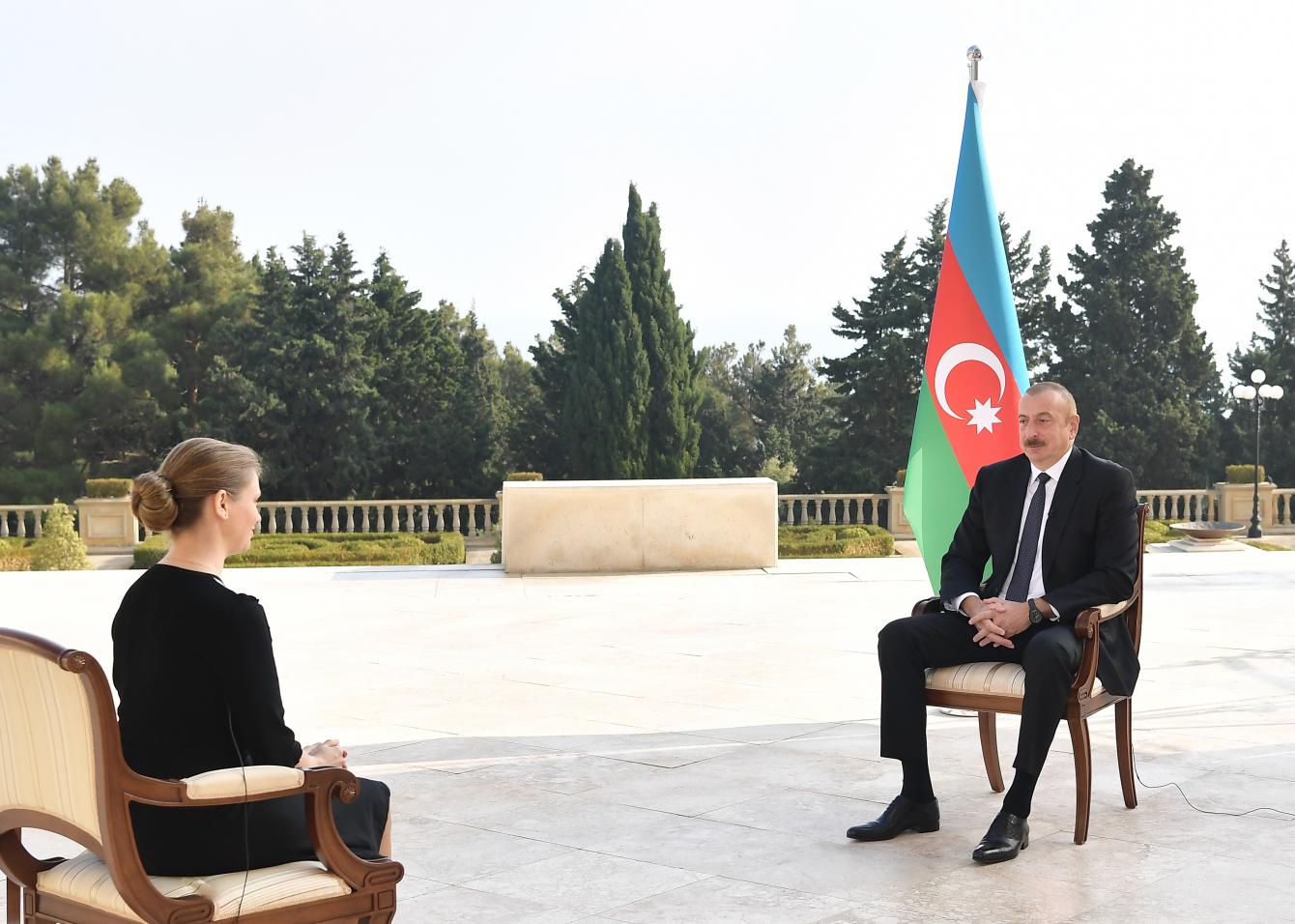
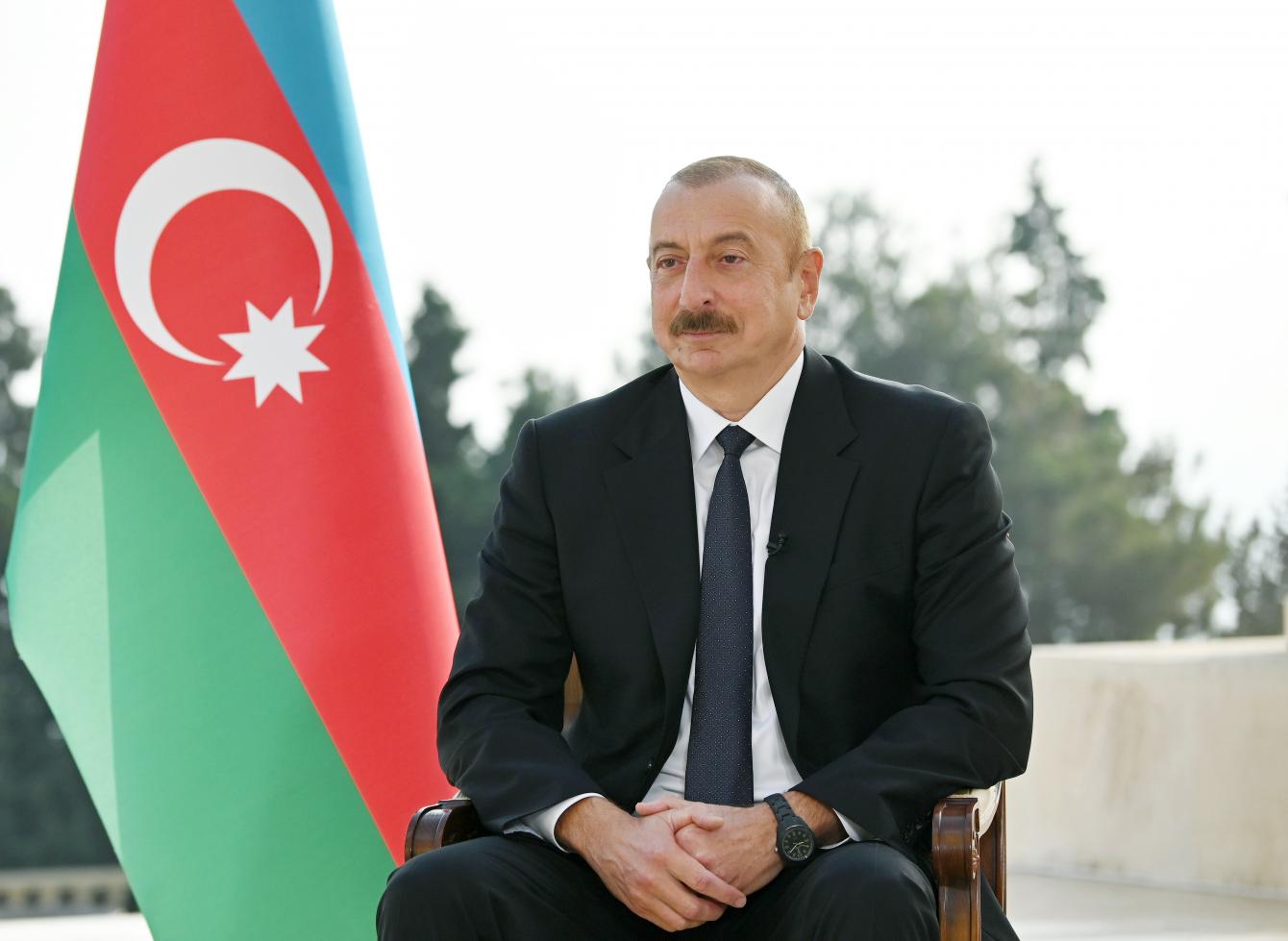

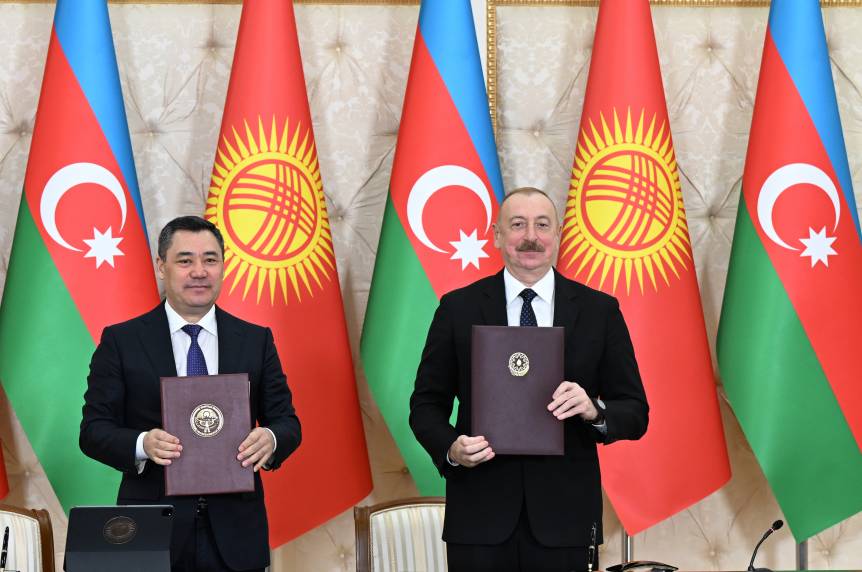
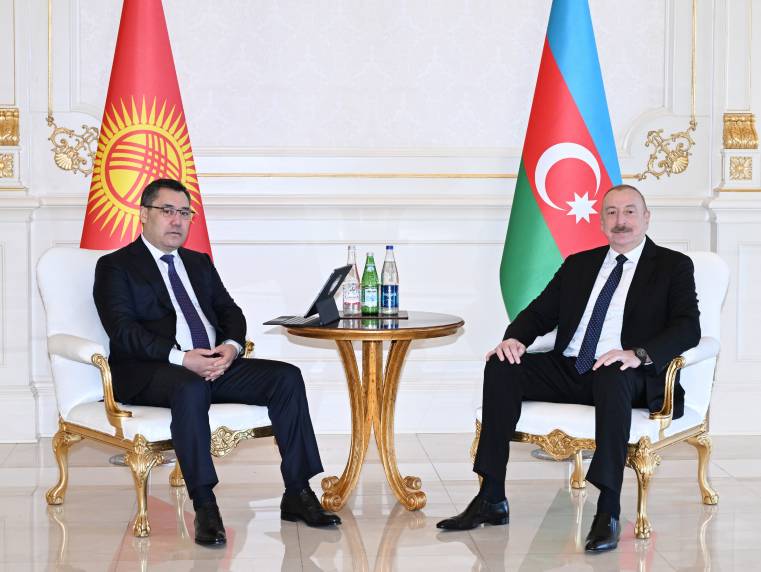
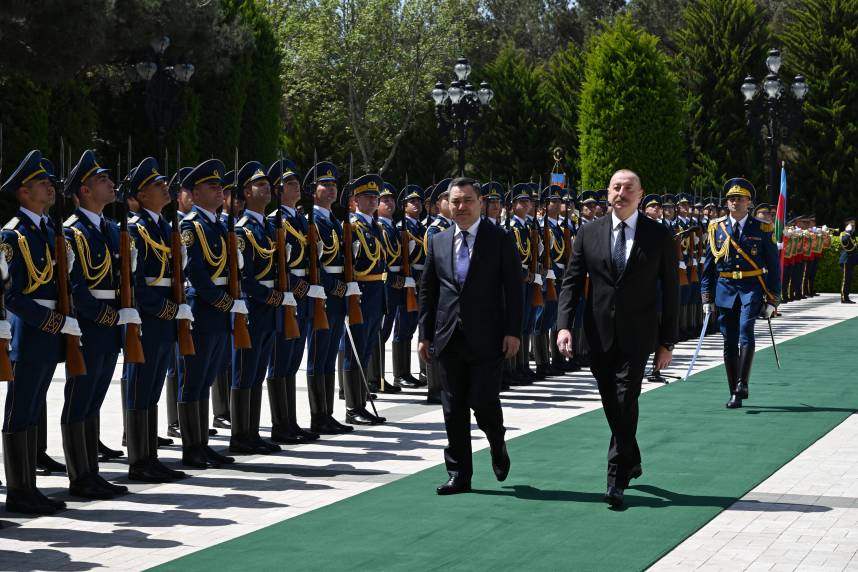
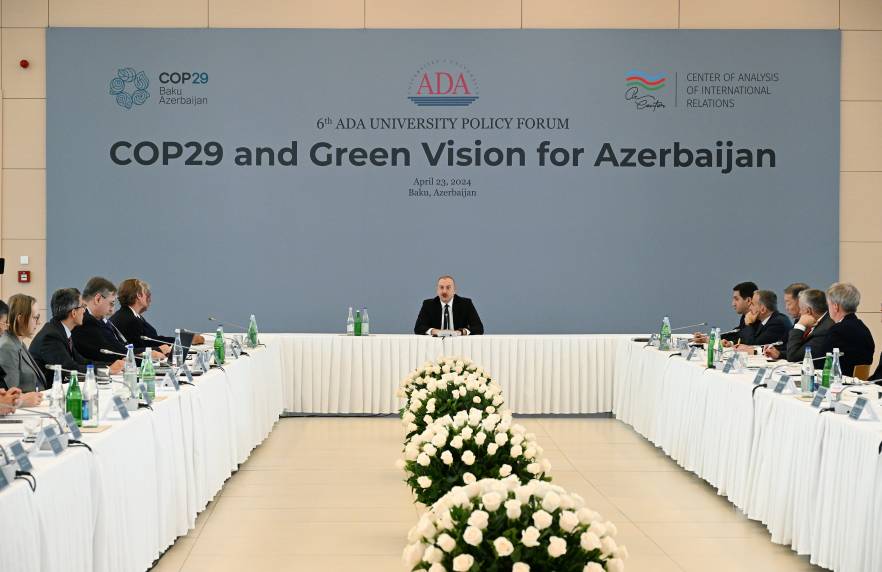
President of the Republic of Azerbaijan Ilham Aliyev completed his working visit to the Russian Federation on April 22.
22 April 2024, 23:13Ilham Aliyev, President of the Republic of Azerbaijan, and Vladimir Putin, President of the Russian Federation, had a joint dinner in Moscow on April 22.
22 April 2024, 20:48